Apollo Punished Rivals For Their Extraordinary Musical Skills
A. Sutherland - AncientPages.com - Among the Olympian Gods, Apollo is the most complex figure in all his aspects.
As central to Greek culture, he has been recognized as a god of music and dance, truth and prophecy, art, healing and diseases, the Sun and light, knowledge, poetry, and archery.
Ancient Roman statue of God Apollo playing a lire. Image credit: Adobe Stock - giorgio
He was also the god of the Oracle and the patron saint of the Delphi. Popular among the gods, Apollo was also loved by ordinary people of ancient Greece.
Though renowned in the art of music, it does not mean he had no rivals who considered themselves equal to him in this respect. He had a few individuals who challenged him to compete in a musical contest.
One of them was Marsyas, and another was Pan. Marsyas was a Satyr who had picked up the flute, which the goddess Athena had thrown away in disgust. After being touched by the goddess's lips, he found that the flute played itself most charmingly.
The Satyr, Marsyas, was a great lover of music and much beloved on this account by all the elf-like creatures living in the glens and woods. He was so intoxicated with the sound of the flute and its discovery that he mindlessly challenged Apollo to compete with him in a musical contest.
 Apollo and Marsyas. House of Aion Mosaic, Paphos. Image credit: Mgiganteus - CC BY-SA 3.0
Apollo and Marsyas. House of Aion Mosaic, Paphos. Image credit: Mgiganteus - CC BY-SA 3.0
The challenge was accepted, and the Muses were chosen referees. It was also decided that the unsuccessful competitor should suffer the cruel punishment of being flayed alive.
For a long time, the merits of both claimants remained so equally balanced that it was impossible to award the palm of victory to either. Finally, Apollo was the one who resolved to conquer by adding the sweet tones of his melodious voice to the strains of his magical lyre.
The result was that he won the competition, but would he win the contest without engaging his incredible voice in his performance?
Marsyas was defeated and very sad. He suddenly realized that he must undergo the terrible penalty of dying in torture. 'Apollo took the cruelest revenge on Marsyas: flaying him alive and nailing his skin to a pine (or a planetree). A legend says that many of Marsyas' companions cried, including the Satyrs and Dryads. Unhappy at his terrible fate, they had gathered all their tears together and created a river in Phrygia, which is still known today by the name of Marsyas.
Pan, the god of shepherds, declared that he could play even more skillfully on his flute of seven reeds than the god Apollo on his lyre. This contest, widely known among the Olympians, also had another competitor. After challenging Apollo, this competitor survived unharmed, but the third rival to Apollo's extraordinary musical skills was Cinyras, king of Cyprus and a great flutist.
Apollo and King Midas. Painting by Simon Floquet, circa 1634.Photographer: Sotheby's – Public Domain
Tradition has it that Cinyras was revered as the creator of art and musical instruments, especially the flute. In one source, he is also mentioned for his physical beauty. The legend says that the king of Cyprus was also an excellent singer, and he posed a musical challenge to Apollo and tested his abilities.
Fate, unfortunately, was not kind to him. His life ended dramatically as the god Mars, who in Greek was the mythological world is identified with the god Ares took Cinyras’ life.
This intriguing contest proceeded, and when it finished, Apollo was pronounced the winner by the all involved judges.
However, Midas, king of Phrygia, disagreed with the judges' decision. He was the only judge who thought that Marsyas was a better player.
Perhaps he had the bad taste to prefer the rather vulgar and primitive tones of the Pan's pipe to Apollo's lyre's enhanced and sweet melodies. Midas, the only judge in the contest, was punished due to his most unusual attitude toward the music of Apollo. Judging him as a stupid man who lacked human ears for music, Apollo gave him the ears of an ass.
Horrified at being disfigured, the Phrygian king had to act quickly to disguise his appearance and disgrace, so he used a Phrygian cap, turban, or another headdress. It was also important that his private barber could keep this most painful secret forever.
Therefore, the man was bribed with gifts of great value, never to reveal the king's secret. Finding that he could not keep the secret any longer, he went out into a meadow, dug a hole in the ground, whispered the story into it:
“‘King Midas has ass’s ears!’ Then he filled up the hole, and went away, at peace with himself until a reed sprouted from the bank and whispered the secret to all who passed. When Midas learned that his disgrace had become public knowledge, he condemned the barber to death, drank bull’s blood, and perished miserably.” 1
Later, a thick bed of reeds sprang up from the covered-up hole and began whispering the story, saying, "King Midas has an ass's ears."
Some sources said that Midas killed himself by drinking the blood of an ox.
Written by – A. Sutherland - AncientPages.com Senior Staff Writer
Copyright © AncientPages.com All rights reserved. This material may not be published, broadcast, rewritten or redistributed in whole or part without the express written permission of AncientPages.com
Expand for referencesReferences:
- Graves, R. The Greek Myths
Walsh, Nicos. Greek Mythology
Fritz Graf, Apollo
More From Ancient Pages
-
 Uruk Was Ruled By Gilgamesh Who Built City’s Great Walls
Featured Stories | Jul 26, 2016
Uruk Was Ruled By Gilgamesh Who Built City’s Great Walls
Featured Stories | Jul 26, 2016 -
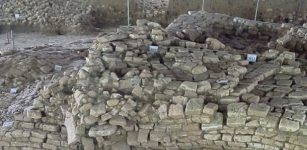 Wrecks of ancient ships found in Malaysia’s Sungai Batu ancient site
News | Sep 4, 2015
Wrecks of ancient ships found in Malaysia’s Sungai Batu ancient site
News | Sep 4, 2015 -
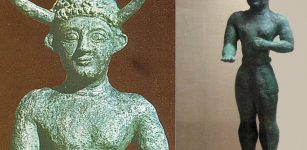 Old Kingdom Of Alashiya And City Of Enkomi With Roots On The Island Of Cyprus
Civilizations | Mar 1, 2018
Old Kingdom Of Alashiya And City Of Enkomi With Roots On The Island Of Cyprus
Civilizations | Mar 1, 2018 -
 Aboriginal Australians Were World’s First Astronomers Who Discovered Variable Stars – Astrophysicist Says
Archaeology | Jul 16, 2019
Aboriginal Australians Were World’s First Astronomers Who Discovered Variable Stars – Astrophysicist Says
Archaeology | Jul 16, 2019 -
 York’s Thriving Medieval Jewish Community – New Study
Archaeology | Aug 22, 2023
York’s Thriving Medieval Jewish Community – New Study
Archaeology | Aug 22, 2023 -
 Mysterious Deserted Medieval Village And Castle Discovered In The Harz Mountains – 2,000 Artifacts Were Found
Archaeology | Nov 14, 2023
Mysterious Deserted Medieval Village And Castle Discovered In The Harz Mountains – 2,000 Artifacts Were Found
Archaeology | Nov 14, 2023 -
 Michelangelo’s Hidden Secrets Under The Medici Chapel
Featured Stories | Jul 16, 2019
Michelangelo’s Hidden Secrets Under The Medici Chapel
Featured Stories | Jul 16, 2019 -
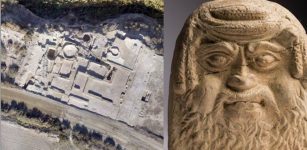 Huge Roman Forum Discovered In Unknown Ancient City In Spain
Archaeology | Sep 4, 2023
Huge Roman Forum Discovered In Unknown Ancient City In Spain
Archaeology | Sep 4, 2023 -
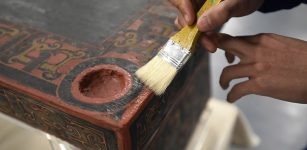 2,500-Year-Old ‘Dragon Bed’ Restored By Chinese Archaeologists
Archaeology | Jan 21, 2018
2,500-Year-Old ‘Dragon Bed’ Restored By Chinese Archaeologists
Archaeology | Jan 21, 2018 -
 Secret Archaeological Excavations Have Led To The Discovery Of An Extremely Rare Ancient Roman Gold Treasure In Parc Hosingen, Luxembourg
Archaeology | Jan 20, 2025
Secret Archaeological Excavations Have Led To The Discovery Of An Extremely Rare Ancient Roman Gold Treasure In Parc Hosingen, Luxembourg
Archaeology | Jan 20, 2025 -
 Mystery Of The Ancient Talayot Sword
Archaeology | Sep 30, 2019
Mystery Of The Ancient Talayot Sword
Archaeology | Sep 30, 2019 -
 Traces Of Ancient Maya In Europe? Controversial Theory Examined
Ancient Mysteries | May 25, 2018
Traces Of Ancient Maya In Europe? Controversial Theory Examined
Ancient Mysteries | May 25, 2018 -
 Unexplained Visions Of Airmen – Strange Presence And Disturbances – Part 1
Featured Stories | Feb 6, 2020
Unexplained Visions Of Airmen – Strange Presence And Disturbances – Part 1
Featured Stories | Feb 6, 2020 -
 Lady Trieu: Fierce Warrior, Rebel, Freedom Fighter And National Hero In Vietnam
Featured Stories | Feb 26, 2019
Lady Trieu: Fierce Warrior, Rebel, Freedom Fighter And National Hero In Vietnam
Featured Stories | Feb 26, 2019 -
 Ancient Necropolis With Lead Coffins Sheds Light On Early Christian Funeral Practices
Archaeology | Jul 13, 2020
Ancient Necropolis With Lead Coffins Sheds Light On Early Christian Funeral Practices
Archaeology | Jul 13, 2020 -
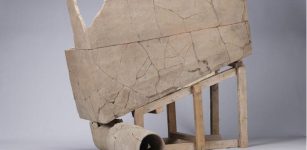 2,400-Year-Old Flush Toilet Discovered In China
Archaeology | Feb 24, 2023
2,400-Year-Old Flush Toilet Discovered In China
Archaeology | Feb 24, 2023 -
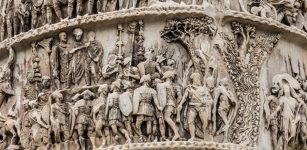 Impressive Column Of Emperor Marcus Aurelius – War Monument From Ancient Rome
Featured Stories | Jul 6, 2017
Impressive Column Of Emperor Marcus Aurelius – War Monument From Ancient Rome
Featured Stories | Jul 6, 2017 -
 Was 4,000-Year-Old Seahenge In Norfolk Built To Battle Climate Change?
Archaeology | May 31, 2024
Was 4,000-Year-Old Seahenge In Norfolk Built To Battle Climate Change?
Archaeology | May 31, 2024 -
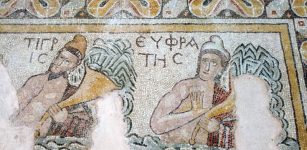 More Beautiful Mosaics In The Ancient City Of Hadrianopolis In Northern Turkey
Archaeology | Sep 28, 2022
More Beautiful Mosaics In The Ancient City Of Hadrianopolis In Northern Turkey
Archaeology | Sep 28, 2022 -
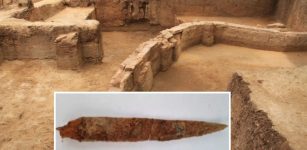 Rare Well-Preserved 2,500-Year-Old Dagger Linked To The Keeladi Civilization Discovered In Tamil Nadu, India
Archaeology | Aug 13, 2021
Rare Well-Preserved 2,500-Year-Old Dagger Linked To The Keeladi Civilization Discovered In Tamil Nadu, India
Archaeology | Aug 13, 2021


